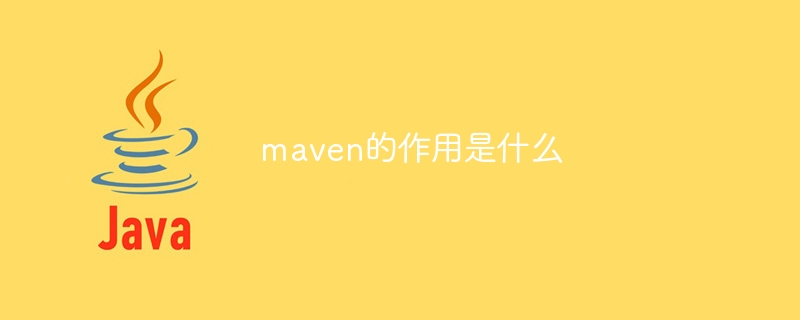Home >Java >javaTutorial >What is the role of maven
What is the role of maven
- 百草Original
- 2024-01-03 17:08:282009browse
The role of maven: 1. Project management and construction; 2. Dependency management; 3. Automated construction; 4. Code quality assurance; 5. Project document generation; 6. Unified build environment; 7. Multi-module projects Management; 8. Plug-in scalability; 9. Cross-platform construction; 10. Integrated version control system; 11. Deployment and release. Detailed introduction: 1. Project management and construction, Maven can manage the construction, reporting and documentation of the project, providing a clear project structure; 2. Dependency management, Maven uses a text file to define project dependencies, etc.

The operating system for this tutorial: Windows 10 system, DELL G3 computer.
Maven is a project management tool mainly used for the construction and management of Java projects. The following are the main functions of Maven:
1. Project management and construction: Maven can manage the construction, reporting and documentation of the project, providing a clear project structure. It uses a conventional directory structure so that all projects have the same directory layout, which helps developers have a clear understanding of the project structure and makes it easier to understand and maintain the code.
2. Dependency management: Maven defines project dependencies through a text file (usually called pom.xml). Developers only need to specify the required dependencies in the pom.xml file, and Maven will automatically download and import these dependencies. In this way, developers no longer need to manually manage project dependencies, greatly reducing the possibility of errors.
3. Automated build: Maven provides some default build life cycles and plug-ins to help developers automate the build and testing process. Through simple command line operations, you can complete tasks such as project compilation, testing, packaging and deployment.
4. Code quality assurance: Maven can be used with some plug-ins to generate some simple unit test reports to help developers understand the quality of the code and provide suggestions for improvement.
5. Project document generation: Maven can generate project documentation, including API documentation, project reports, etc., to help developers better understand the structure and implementation of the project.
6. Unified build environment: Maven can provide a unified build environment so that different developers can develop and build under the same configuration. This helps improve the maintainability and reusability of your project.
7. Multi-module project management: Maven supports the construction and management of multi-module projects, and can organize multiple related projects into one project to facilitate unified management and construction.
8. Plug-in scalability: Maven has a rich plug-in ecosystem. Developers can extend Maven's functions through custom plug-ins to meet the specific needs of the project.
9. Cross-platform build: Maven's build process is cross-platform, ensuring the same build results whether on Windows, Linux or Mac OS.
10. Integrated version control system: Maven can be integrated with a version control system (such as Git) to facilitate the management of project versions and releases.
11. Deployment and release: Maven provides a complete deployment and release mechanism. Developers can publish projects to local or remote warehouses through simple commands.
To sum up, Maven is a comprehensive and easy-to-use project management tool suitable for projects of all sizes. By using Maven, developers can manage projects more efficiently, reduce errors, and improve code quality and maintainability.
The above is the detailed content of What is the role of maven. For more information, please follow other related articles on the PHP Chinese website!

